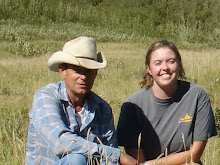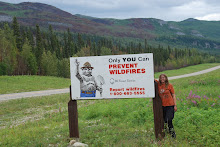 January 18th in shorts and a shirt with no sleeves and it's +17C - the hottest weather I've ever been in on this date!!! Current weather in Nellie is -29C!
January 18th in shorts and a shirt with no sleeves and it's +17C - the hottest weather I've ever been in on this date!!! Current weather in Nellie is -29C!It's true that I am here to become a wise scientist with breadth and depth, yet to do so I have been reminded that I need to keep living out loud as well. I am foraging my way through the "Principles of Range Management", harvesting my way through forestry papers, analyzing my way through SAS (statistics), and beginning to map my way through GIS programming; yet the north country will not loosen her hold. I am constantly relating back to our great white north and processing how what I'm reading, learning and experiencing can be, is or should not be played out in our neck of the mountains.
As most of you know, it was Martin Luther King Jr. day yesterday. A man who had a dream and spoke one of the most powerful speeches of humankind. A man for whom I am thankful for as he has reminded me on his 81st birthday that it is not enough to pass through my days without being thankful for the freedoms I live, that we all live, and that truly every day is a gift and we must make the most of it whether that be in science, in our communities or in any of the other endless possibilities we can imagine. Today, I am especially thankful for my freedom of speech and thought.
Last night we marched with him in mind and a community came together to sing and share music which both produces and is a result of passion and faith. In a re-enactment of his famous speech, I heard the words of hope, that one day freedom would reign and that all would be treated equally. Of a leader who, although torn and battered by many, would remain going peacefully into the night. I also see that as a scientist, even though a passion can lead a person one way, the science may not always result in a positive conclusion or a happy ending that feels comfortable. Perhaps scientific freedom means having the ability and courage to explore something but not necessarily coming out with the results one expected. What if those results are seen in a negative light or as scientists, we are seen as having a negative attitude based off the data that is produced? What if we are surrounded by a culture unwilling to be open and allow such freedom of thought to resonate? But then, what is the difference between having a positive attitude vs. having a negative attitude?
"... woke up this morning with my mind - stayed on freedom
woke up this morning with my mind
-- stayed on freedom
woke up this morning with my mind
-- stayed on freedom
Hallelu, hallelu, hallelujah
...
Nobody will stop me cause my minds
-- stayed on freedom
Nobody will stop me cause my minds
-- stayed on freedom
Nobody will stop me cause my minds
-- stayed on freedom
Hallelu, hallelu, halleluha..."

And so there lies Early Detection and Rapid Response, invasive plant management and pooled resources delivery - all that we do in the north east and in BC around weeds. I am challenged with the questions about if we think we can prevent, treat and eradicate weeds in the NE and I am enlightened by learning that in fact the silent threat has perhaps been sitting under my nose since I moved to the North and it wasn't until I went further north to the Yukon that I learned the significance of sweet clover and smooth brome's invasion in Canada's North.
If we are truly to be the first line of defense for the North West Territories, the Yukon and Alaska, we have a responsibility to take care of what is growing on our highways in a creative manner that involves a solution to the issue. It has been discussed as being one of the big attractions for wildlife and perhaps a greater effort needs to be placed on either a new seed mix or a revegetation with an undesirable species that is native and invasive only along the highway right of ways. Definitely not news to those in the north and the suggestions have been discussed for at least 5 years now, but perhaps we need to reflect critically on those agronomics which have become such huge, catastrophic devestators in other parts of North America. Learning by what other's have gone through is a portion of what will keep our Final Frontier native and weed free.
 Prescribed burning in the Boreal with wildlife biologists Rob Woods and Conrad Thiessen (Ministry of Environment).
Prescribed burning in the Boreal with wildlife biologists Rob Woods and Conrad Thiessen (Ministry of Environment).Fire. I am on fire, immersed in fire, thinking about pyric herbivory as soon as I open my eyes and sometimes even in my sleep. We are pyric herbivory in real time in the Muskwa-Kechika Management Area. What if we took fire out of the system? What do I expect the M-KMA to be like in a changing climate? So many tens on tens of questions that I have started discussing with fellow classmates and professors. I was a believer before but it appears that the more critical and analytical I am becomming, the stronger I feel about fire in the Boreal. What I have seen over the past 4 years and observed is now going to be challenged with scientific methods and objectives. It will be a hot time!
 Alicia Goddard, Ecosystems Biologist from the Peace Ministry of Environment doing vegetation work 3 months post fire in the Boreal with impressive growth. Impressive growth - how can that be wrong?
Alicia Goddard, Ecosystems Biologist from the Peace Ministry of Environment doing vegetation work 3 months post fire in the Boreal with impressive growth. Impressive growth - how can that be wrong? Nice veg!
Nice veg! Sam in 3 month old prescribed burn in the Boreal.
Sam in 3 month old prescribed burn in the Boreal.











































No comments:
Post a Comment